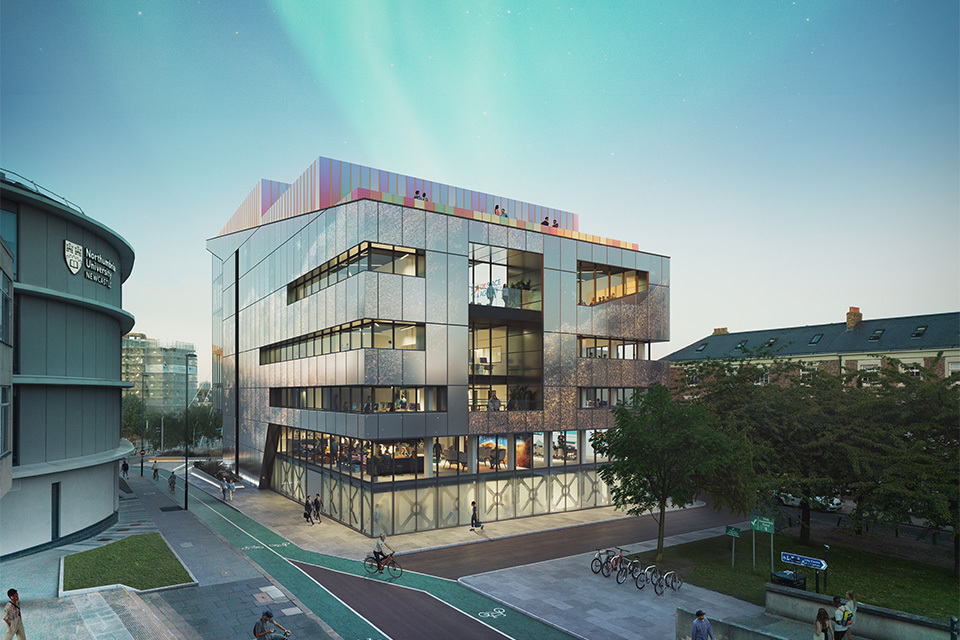The Space Clusters Infrastructure Fund (SCIF) has awarded more than £47 million for 12 projects which will be doubled by match funding from the sector, representing over £98 million of new private/public investment in space research and development infrastructure. Further projects will be announced in the coming weeks.
Not only will the funding support the growth of UK space businesses and create new jobs, but it will enhance the UK’s offering of space capabilities and services to international investors and major space players. SCIF funding builds upon investment the UK Space Agency has made to develop the UK space ecosystem; building and connecting clusters of space capabilities across the country which create the environments for businesses to start-up and flourish. These clusters will help SCIF projects connect to local talent and supply chains and ensure the benefits of this investment are shared across the UK.
Minister of State at the Department for Science, Innovation and Technology, Andrew Griffith, said:
Making Britain a space superpower means backing brilliant ideas up and down the land and harnessing the full potential of talent in our growing sector – from Dundee to Newcastle, Cornwall to Snowdonia.
By investing with the private sector in research and facilities across the UK, we are ensuring they become home to global industries that support the growth of our £17.5 billion space sector, create hundreds of new jobs and build dynamic businesses across the UK.
Dr Paul Bate, Chief Executive of the UK Space Agency, said:
Our space sector has been concentrated in London and the South East, but in recent years we’ve seen the emergence of vibrant clusters across the whole of the country. These projects demonstrate the potential of our thriving space sector across the length and breadth of the UK to develop innovative space infrastructure that helps us to deliver increasingly ambitious missions and capabilities, and champions the power of space to improve lives.
The Space Clusters Infrastructure Fund highlights the government’s commitment to space and will help deliver the goal set out in the National Space Strategy to build one of the most innovative and attractive space economies in the world, developing new skills and creating jobs.
Northumbria University will use £10 million of SCIF funding to develop the North East Space Skills and Technology (NESST) centre in the heart of Newcastle, providing jobs and investment to the area and delivering services that will allow companies to make their space products mission-ready, accelerating their entry into commercial markets. The increased capabilities will help position the UK as a global leader in optical satellite communications, space weather and space-based energy.
Almost £8 million will go to Cardiff-based Space Forge for a National Microgravity Research Centre, for advanced material research and production. Alongside the development of centre tooling and open access facilities for customers, the centre will create a central space hub for the growing Welsh space sector.
Magdrive will use just under £2 million to build a state-of-the-art Electric Propulsion facility in the UK. The DEEP Lab (Disruptive EP) will meet the growing demands of small-satellite Electric Propulsion (EP) serving as a cornerstone for EP development, enabling rapid development and testing of EP solutions, integration of EP technologies into a wide range of space missions, and the development of innovative manufacturing approaches to meet the assembly, testing and cost reduction needs of modern satellite constellation missions.
The government has previously invested in space infrastructure such as the National Satellite Test Facility (NSTF) and National Space Propulsion Test Facility on a case-by-case basis. The NSTF, due to open later this year in Harwell, features the UK’s largest vacuum test chamber, where satellites the size of a double decker bus will be exposed to extremes of hot and cold for months at a time, and a vibration facility that replicates the conditions of a rocket launch. The National Space Propulsion Test Facility in Westcott allows UK organisations to test state-of-the-art engines which move small satellites in space, at a more affordable rate than having to go abroad.
Lizzie Kerr, Director of UKspace, said:
The national geographic diversity and spread of funded projects is welcomed and applauded by UKspace whose members are based right across the UK.
The government’s commitment to the space industry is endorsed by this Space Clusters Infrastructure Fund supporting the UK space industry to lead and deliver in SpaceTech. Providing this funding enables space companies to accelerate their respective products into the market both nationally and internationally and this helps to make the UK an attractive place to do space business.
The UK Space Agency’s funding for national projects, including SCIF, is in addition to £1.84 billion invested through the European Space Agency in November, ensuring the UK’s space and commercial satellite sector will play a leading role in future international missions and innovative commercial programmes.
Funded SCIF projects across the UK include:
Thales Alenia Space: Harmonica Project, Harwell
Funding: £6 million
This project will install and commission a cleanroom and three R&D laboratories to perform system development, assembly & integration of satellites, with state-of-the-art digital factory 4.0 capabilities, enabling Thales Alenia Space to deliver satellites and systems for institutional, defence and commercial markets.
Magdrive Ltd: Disruptive Experimental Electric Propulsion Laboratory (DEEP Lab), Harwell
Funding: £1.8 million
Building a state-of-the-art Electric Propulsion (EP) facility to meet the growing demands of small-satellite EP, serving as a cornerstone for EP development and startup prototyping in the UK.
Smiths Interconnect: C-SQUARE, Dundee, Scotland
Funding: £1.9 million
This project will expand and open up access to infrastructure for rapid engineering, qualification, and digital fabrication to dramatically reduce time-to-market, costs of radio frequency (RF) and optical space components.
Northumbria University: North-East Space Skills and Technology (NESST) Centre, Newcastle
Funding: £10 million
This project will deliver R&D infrastructure needed to make space products mission-ready, accelerating their entry into commercial markets, through the re-development of a site on Northumbria University’s city centre campus, helping to position the UK as a global leader in optical satellite comms, space weather and space-based energy.
Airbus Defence and Space: Space Community Catalyst Facility, Stevenage
Funding: £3.9 million
Airbus Defence and Space Ltd will establish at their Stevenage site a ‘catalyst facility’ for use by the space community; providing industrial grade R&D facilities to develop, de-risk, validate and verify technology across the space mission and service life cycle for civil, defence and commercial use.
iCOMAT: ACMA, Somerset
Funding: £4.8 million
iCOMAT will create a new fully automated production facility and form a cluster of domestic R&D and production sites that leverages the UK’s expertise in composite materials to deliver the new state of the art in space structures. The cluster will enable users of the infrastructure to develop world-class products across multiple space market segments.
URA Thrusters, Westcott Venture Park, Buckinghamshire
Funding: £5.9 million
This proposal is for a 62,000 sq. ft development including training facilities, communal space and shared technical facilities available for industry and academia to rent, including a lecture theatre, classrooms, a workshop and space for industry to rent. This facility will be a ‘destination’ for visitors to the Westcott Space Cluster, and a vital service for those based here.
Open Cosmos: Larger Earth observation platforms And Production (LEAP), Harwell
Funding £5 million
Open Cosmos will put in place the latest industrial facility to expand its manufacturing and R&D capability for microsatellite and constellation markets, while also extending its reach of data commercialisation, and expertise with organisations such as Space Park Leicester.
Snowdonia Aerospace LLP: Space Technology Test Centre, North Wales
Funding £800,000
Snowdonia LLP will develop the Space Technology Test Centre (STTC) at the Snowdonia Space Centre, Llanbedr, Gwynedd, in partnership with Newton Launch Systems Ltd. The centre will exploit the unique location of the Snowdonia Space Centre, with its own immediate Danger Area and direct access to a larger Danger Area over Cardigan Bay, to provide a flight test range for rocket-powered test vehicles, near-space scientific flights, microgravity research and trials of re-entry vehicles and payload recovery systems. The test range will be complemented by a space technology testing laboratory featuring a centrifuge, thermal vacuum chamber, vibration table, aerostructures rig and a rocket engine test stand.
Radtest Ltd: SEREEL2 project, Harwell
Funding: £300,000
This project proposes work to establish a laser single-event effects test capability in the UK for the first time, replacing the need to travel overseas to a test facility for space radiation testing of electronics.
Centre for Modelling and Simulation Services Ltd: Collaborative Space Data Centre (COSDAC), south-west, including Bristol and Cornwall and a partnership on the project with the Open university in Milton Keynes
Funding: £342,000
Centre for Modelling and Simulation (CFMS) will develop the Collaborative Space Data Centre (COSDAC) to address a strategic gap in commercial data centre provision for the space industry. A dedicated space data centre that leverages advanced technologies such as simulation, AI, and robotics testing.
Space Forge, Cardiff
Funding: £7.9 million
This project will see the design and build of a National Microgravity Research Centre, creating a world-class, and unique, facility for advanced material research and production with an initial focus on growth of inorganic crystal structures in microgravity. Alongside the development of centre tooling and open access facilities for customers, the centre will create a central space hub for the growing Welsh space sector.







